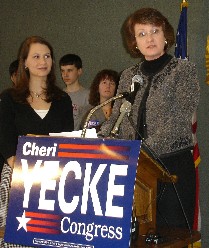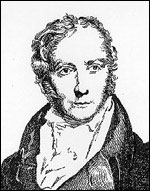[Long Post]
READER COMMENT-- This is probably the longest post I've had the patience to read in full. What's the blog equivalent of "couldn't put it down"? Thanks so much!
On the MPR MIDDAY program on Wednesday, February 9, host Gary Eichten moderated a debate between State Senator David Hann (R-Eden Prairie) and State Senator Steve Kelly (DFL-Hopkins) over the Hann/ Buesgens proposed legislation that would allow low-income families in the Minneapolis and St. Paul school districts to apply for “education access grants” (vouchers) to send their children to any accredited, non-public Minnesota school of their choice.
Gary Eichten did an outstanding job moderating this debate, keeping the participants on point and framing questions such that they required specific answers. 
Overall, Senator Hann did an excellent job staying on his point that, when the rhetorical smoke clears, this debate boils down to who ultimately are schools accountable to -- parents and students or the state and (the argument goes) taxpayers.
 Senator Kelly was equally dogged on the accountability issue claiming that parental accountability was not the only consideration for public education and that the benefit to society of education was equally important. Below, based on my notes on the debate (not a verbatim transcript), are the comments of the participants [along with some comments of my own]. An audio of the debate can be heard on the MPR site.
Senator Kelly was equally dogged on the accountability issue claiming that parental accountability was not the only consideration for public education and that the benefit to society of education was equally important. Below, based on my notes on the debate (not a verbatim transcript), are the comments of the participants [along with some comments of my own]. An audio of the debate can be heard on the MPR site.
Eichten started the debate with the obvious question, “Why do we need vouchers?”
Hann responded that we recognize that parental choice in education is important; that there is educational choice today for people with the means to do so. The proposed legislation recognizes and fairness demands that people of limited economic means have the same opportunity for choice.
Eichten followed up asking why the proposed legislation only applied to the St. Paul and Minneapolis schools districts, not the entire state.
Hann replied that supporters of the legislation are not opposed to expanding the bill if that’s what people want. The rationale for limiting the coverage of the bill is to provide an opportunity to test concept. The bulk of the people eligible for education access grants are in Minneapolis and St. Paul and so are most of the private school options. But supporters of the bill are not opposed to expanding it.
To Senator Kelly, Eichten rephrased the opening question -- “Why not vouchers?"
Kelly did not answer the question directly, but tried to steer the question to the ad hominem argument of motive. The legislation, he said, doesn‘t reflect the public school choice already available. He argued that if the bill is the right thing to do, we should do it everywhere in the state, but he asserted, Hann and co-sponsor Representative Mark Buesgens (R-Jordan) were concerned about feedback in their districts. There are poor kids everywhere, but Hann and Buesgens want to focus on Minneapolis and St. Paul because they are “easy targets.”
Eichten did not allow Kelly to duck the question, but rephrased and repeated it -- But why not allow low-income families the same options as the wealthy?
Kelly responded that the choice offered by the bill is illusionary. The amount of the voucher is $4,600. Holy Angels Academy charges $8,000 for tuition and Blake School is even more. Even with $4,600 low-income parents don’t have the same choice as wealthy parents. The legislation doesn’t reflect reality. The proposal is really a step down the road to vouchers for everyone, which undermines public education.
[Before we move on to the question of whether or not the proposed legislation does indeed undermine public education, let’s look at the debate thus far. Hann has basically stated his rationale for the bill -- giving low-income families the same opportunity for school choice as more well-to-do families have. Kelly has tried to taint Hann’s motives, but made one point -- that a $4,600 grant still doesn’t provide low-income families with the same opportunities as the wealthy.
The difference here is one of perception, or rather misperception, of what is meant by “school choice” that is fostered by language used by both Hann and Kelly. “School Choice” does not mean that a parent receives state funding to send a child to any private school they desire. It means the ability to remove a child from a school that is not meeting the child’s needs and place that child in another school -- public, private or religious -- that might, in the parent’s opinion better educate that child. Currently, 85 percent of non-public schools in the Minneapolis and St. Paul charge tuition less that $4,600. Kelly's "reality" that the proposed legislation doesn't provide low-income families with ALL of the opportunites available to the wealthy ignores the reality that it provides low-income families opportunities they do not have now.]
Resuming the debate -- Eichten asked Kelly to elaborate on how vouchers undermine public education.
Kelly cited charter schools as an example. He put the effect of a child leaving a school in terms of dollars and cents -- under the proposed legislation, if 10 students leave a public school, that’s $46,000 in revenue that leaves the school. That’s a teachers salary and that teacher teaches a lot more than 10 children. The loss of that teacher means larger class sizes and perhaps even the need to close some schools.
Eichten rephrased the question to Hann, asking if his legislation was a threat to public education.
Hann didn’t hedge in answering that it was not a threat. He believes that the legislation will actually help public education. He acknowledged that some private schools charge more for tuition that $4,600 but cited the 85 percent figure for private schools in the Twin Cities with tuition less than $4,600. He said he has heard from parents that the $4,600 would be helpful if they chose a more expensive school. Hann then repeated his point that the purpose of the bill is to help all kids get a good education, There are, he said, pressures on the public school system today. Students from families that can afford it are leaving the system already, and he doesn’t see his legislation changing that dynamic. He pointed out that today when a student leaves the Minneapolis or St. Paul school district, all the funding leaves the district. Under the Hann/Buesgens bill, only $4,600 leaves with the student. The balance of budgeted funds remains in the district (phased out over three years). If every student eligible under the bill took advantage of it, in the first year that would equate to a $300 more per pupil funding increase for students remaining in public schools. Hann returned to the issue, whose interest is primary -- kids and education or a school system protecting its revenue stream?
[At this point in the debate, it is becoming clear that Hann’s parting question is not rhetorical, but the central issue of the debate. Kelly’s example of $46,000 leaving a school means the loss of a teacher is somewhat fallacious. The $4,600 is the amount of instructional cost associated with a student statewide. Overhead costs of per pupil education remain with the districts under the Hann/Buesgens bill. The school districts have more money per student to focus on fewer students. It is hard to see how that is a threat.
To use Kelly’s logic of applying the total revenue loss to a single teacher, the math would like this: To total cost to educate a student in St. Paul is, in round numbers north of $11,000. Ten students leaving at $4,600 each leaves $6,400 per student with the district, times 10 students, equals $64,000 additional dollars to spend on the remaining kids in the class. Of course, that reasoning is fallacious. Money is left behind for the school district, but the affect per class room is not that great -- nor is the negative affect Kelly tries to portray as great. He can’t have it both ways. ]
Resuming the debate -- Eichten asked the question “Whose interest must be protected?” Kelly was surprisingly if not shockingly candid in his response. Paraphrasing his remarks, he said, “Parents need to step back and realize that public education is not just about the parent or the child. Public education is what is good for all citizens. The effect is that Minnesota is a more prosperous state because of public education.” Kelly accused Hann of wanting to narrow public education to just the parent and student and leave out the broader benefits to society. He said that in a public system, all schools must be subject to “accountability mechanisms.” All students must be measured to insure that schools are accountable. He said the proposed legislation would give money to private schools but not hold them to the same level of accountability.

[Kelly’s comments call for a rather lengthy aside that departs somewhat from the debate itself. His notion that society at large is ultimately responsible for defining content of public education through “accountability mechanisms” reflects the thinking of Marc Tucker, President of the National Center on Education and the Economy (NCEE). On his web site, Scholar’ s Notebook, education commentator Matt Abe writes --
"Education reform activists will recognize Tucker as the author of the "Dear Hillary" letter that started us on the road to a federal curriculum (Goals 2000) and Soviet-style polytechnical education (School-to-Work) back during the first Clinton administration. This is where Minnesota's discredited Profile of Learning graduation sandards came from."
[In fairness, Tucker’s influence, while strong during the Clinton administration, began during the Bush 41 years.]
Abe’s citing of Tucker is in the context of a meeting between Tucker and state legislators arranged by St. Paul Public Schools Superintendent Pat Harvey. At the meeting, Tucker and Harvey pitched their vision of “transforming” public schools [link added]. The evening meeting was for legislators only -- no staff, no public, no press.
To understand the real significance of this meeting, and to provide context for Kelly’s remarks in the debate, a knowledge of Tucker’s book "Thinking for a Living: Education and the Wealth of Nations" is helpful. It is a must read for supporters of school choice, not because they will agree with it, but because it reveals the mindset of those who would turn education into a tool of state economic policy. As favorably described in an Amazon.com review --
A highly educated and trained workforce is the key to economic growth and full employment, assert the authors of this boldly visionary book, an important contribution to the debate over national priorities and the U.S.'s economic competitiveness. They urge the nation's employers to heed the lessons learned by Germany, Japan, Sweden and Singapore--countries that have linked education and economic policy into a single integrated strategy.
I read this book several years ago, and it still frightens me. Tucker reduces public education from an individual pursuit of knowledge to a tool of the state to guarantee available labor for projected economic needs. And you can guess who it is that determines those needs.
Whether or not Kelly is a baptised Tucker disciple, I don’t know, and it is irrelevant. His debate comments about public accountability for education mirror Tucker’s philosophy and pose a dangerous threat to individual freedom.]
Resuming the debate -- A caller directed this question to Senator Kelly: “the graduation rate in Minneapolis is 56 percent and poses a problem for the community in the future. How can you [Senator Kelly] look a parent I the eye and vote against the opportunity for better education?”
Kelly was again surprisingly strident in his response. Paraphrasing his response, he said “I can look a parent in the eye and say if your student is in danger of failing maybe you haven't been involved enough in your child's education regardless of what school it is.” Kelly went on to say that a parent that has already made a choice is not the parent covered by the bill. Those parents are already engaged in their children’s education. The Hann legislation will not affect the drop-out rate. The Minneapolis and St. Paul schools have put in place a number of programs to engage parents. They are doing a good job. Kelly did acknowledge that we still need to do a better job.
[An aside is required here. As I’ve written numerous times before, it always amazes me when public education supporters consider problem students and problem parents speed bumps in the road to a effective education when educating problem students from homes where education is not a priority is probably the most societal significant function of “public” education. The fact is, many private schools do take low income, non-native speaking kids with behavioral problems and deal with them as individuals. Do they always succeed with them? No, but, they succeed much of the time, and they never whine.]
Eichten turned his attention to the Milwaukee Public Schools where 16,500 students are currently enrolled in the voucher program. “Have they benefited from the program?” Hann responded first citing a study by Jay Greene of the Manhattan Institute finding that students attending private schools through Milwaukee's voucher program had higher high-school graduation rates than students remaining in public schools, even those in academically selective public schools. Since the inception of the voucher program, public school graduation rates also increased. He also noted that voucher supporters in Milwaukee have tried to conduct a broader more rigorous study of the voucher program, but were blocked by voucher program opponents from conducting the study.
Kelly contended that such studies do not account for the selection bias that is built into a voucher program when a parent is engaged in a child’s education. He noted that there is now broad public school choice and that the parents who take advantage of such programs are going to do more for their kids and those kids have the advantage of family support for education. He also noted that private schools are not subject to the mandates of the NCLB act and therefore tests aren’t given to test schools for accountability. He charged that Hann doesn’t want accountability for private schools.
Eichten asked Hann if he agreed with that assessment.
Hann said that the education access grant legislation requires students using grants to take same tests as public school students. He also noted that many people contend that the requirements of the NCLB act are unnecessary federal impositions on public schools. Why then, he wonders, would we impose those regulations on private schools. Under his bill, vouchers must be used at accredited private schools that are already regulated. Again he returned to his theme that ultimately parents are accountable for their children’s education. Parents must have enough of a say in that education to move a child out of a school. Today that choice is not available to low-income parents. Many have applied to private scholarship funds, but those funds don’t always have the resources to meet the demand.
[What’s interesting to note at this point is that Kelly’s responses reflect the attitude that Hann cited when he noted that it was opponents of vouchers -- teacher’s unions and school administrators -- that prevented definitive studies on the effectiveness of voucher programs. It is clear that Kelly is operating on the premise that concept of vouchers is bad for the current system and his job is to protect the system.
Hann is being diplomatic, but it’s clear he believes the current public education system is failing to educate a significant number of children. However, although advocating vouchers to give these kids a chance, he is not condemning the “concept” of public education. His immediate goal is helping kids now by allowing the opportunity to move to schools that working. If we give Kelly the benefit of the doubt, his solution is keep kids in public schools with the promise to fix them.]
Resuming the debate -- Eichten asks -- Would private schools have to take all students, like the public schools? Hann replied that the proposed legislation would not impose changes in the ways private schools admitted students. He didn’t believe the state had the right to do that. He pointed out that the education access grant established under the legislation was funding families to help facilitate school choice. It is not right for the state to make private schools treat some students differently than others.
Eichten to Kelly -- “Is that alright with you?”
Kelly states that Hann and Buesgens “engage parents in money laundering” so it doesn't look like money goes to a private school. Kelly states that under the bill, money must be endorsed over to the school. He noted that Eichten made a key point about public education when he stated that public education must take all comers. If private schools are successful, Kelly said, it’s because they have been selective.
An online question: This listener called the proposed legislation an “end-run” to get tax dollars to private and religious schools. He stated it was not right to use his tax dollars to support schools that discriminate. He noted that Catholics don’t allow women to be priests. He asked, “ What if a school taught white supremacy or the KKK? Would you [presumably Hann] want you tax dollars to go to that school?”
Eichten modified the question to a broader question of the constitutionality of the proposed legislation.
[Before getting into the constitutionality, a brief aside. This is the only time in the debate where I think that Eichten slipped a little. He stripped the caller’s question of its passion and tossed a softball to Hann. The constitutionality issue is dealt with below, but I’d like to address the “discrimination” question, which is not.
Sending tax dollars to religious schools is a very real and very emotional issue for some people, which is why I personally favor universal tuition tax credits over vouchers. Nonetheless, the problem raised by the caller exists today and is neither created nor solved by the proposed legislation. Tax dollars fund many educational programs of which many people disapprove -- sex education, teaching evolution, emphasis on multiculturalism, American history from a western European perspective and the like. The proposed legislation actually reduces the problem of discrimination in a small way in that it enables parents to move their children from schools that don’t represent their values. This could even apply to a family that is considering a low-tuition Catholic school as an alternative to public school that with the aid of a voucher might be able to afford a more expensive secular private school.
The second issue of white supremacy schools or Muslim jihad schools or “hockey schools” or whatever one fears is basically unfounded under the proposed legislation. Vouchers can only be used at accredited schools. Parents are not dumb. Life is a bell-shaped curve, and voucher participants will tend to the middle of the curve.]
Back to the debate and the constitutionality of the proposed education access grant. Hann took up the question first and declared that the bill as written would pass constitutional muster. He noted that the state already provides funds to private schools for books, for transportation and other items. Higher education funding is provided for students attending schools like St. Thomas. The state funds families for daycare, which is money that may end up at a church daycare center. He repeated the premise of the legislation -- that it is funding families for educating kids and ultimately it is the families that decide where the money will go.
Eichten directed the question to Kelly -- “Senator Kelly, do you see a constitutional issue here?”
Kelly responded that the Minnesota State Constitution does prohibit public funds from going for the religious instruction. Kelly noted that he went to Catholic school and private high school. He said it is okay that we support private schools with funds for non-sectarian books, but believes that we must, as is done now, draw the line at tuition for religious instruction. He argued that the only way to say the proposed legislation is not a constitutional issue is to fail to look behind the money laundering aspect of the bill.
[The prohibition against use of public funds for religious schools is Article XIII Section 2 of the state constitution, which reads --
Sec. 2. PROHIBITION AS TO AIDING SECTARIAN SCHOOL. In no case shall any public money or property be appropriated or used for the support of schools wherein the distinctive doctrines, creeds or tenets of any particular Christian or other religious sect are promulgated or taught.
It should be noted that this prohibition was not in the original Minnesota State Constitution but was added in 1877 as part of a wave of so-called Blaine Ammendments,” named for Representative James G. Blaine, who pinned presidential aspirations on introduction of a similar amendment to the U.S. Constitution. The primary purpose of the amendment was to prohibit aid to Catholic schools. That attempt failed, but the idea was imbedded in 29 state constitutions within the next 15 years, including Minnesota.
Blaine Amendments were passed as a direct result of the nativist, anti-Catholic bigotry that was a recurring theme in American politics during the 19th and early 20th centuries. Writing the majority opinion in the Supreme Court's Mitchell v. Helms decision in 2000, Justice Thomas was explicit in stating the background of Blaine Amendments. He wrote --
"[N]othing in the establishment clause requires the exclusion of pervasively
sectarian schools from otherwise permissible aid programs, and other doctrines
of this court bar it. This doctrine, born of bigotry, should be buried now."
And it has been. No Minnesota court has ever used Article XIII Section 2 as a basis to strike down a program under which state assistance flowed to parochial schools. If the sectarian schools provision were used to challenge the Hann/Buesgens bill, case law and the moral high ground is on the side of the proposed legislation. (Hat tip to Lee McGrath of the Institute for Justice for the legal references.)]
Resuming the debate -- A caller made the comment that there is more urgency in the St. Paul schools and therefore it made sense to implement a voucher program in that area. The caller pointed out that public schools are not working and there is a need to try something different. The caller then asked Kelly if he were opposed to Pell Grants [federal grants to college students that may be used at sectarian colleges].
Kelly noted that Minnesota has a constitutional obligation to provide a system of education that is comprehensive and uniform across the state and has a constitutional prohibition against funds for education at the K-12 levels.
He supports the state grant program where state funds may be used at sectarian colleges like St. Thomas. He noted that legislators live with a lot of ambiguity, but he believes that if support we go down the road of funding religious schools at the K-12 levels we are making a fundamental mistake that will be damaging to the health of our democracy. Public education, said Kelly, is part of our heritage from before the time of the constitution. He cited public education in the Commonwealth of Massachusetts as an example.
[Brief aside. Both Kelly and St. Paul Superintendent Pat Harvey have a strange view of American history when it comes to the founder’s views on public education and separation of church and state. Harvey’s ideas are addressed here. Kelly should note that the purpose of Massachusetts public education, in which teachers were often ministers of local churches, was to ensure that children were properly schooled in religion and could read the Bible.]
Kelly continued his response by disagreeing with the caller that things aren’t working in St. Paul Public Schools. He said he could understand Harvey’s angry response to the Hann/Buesgens legislation. He noted that test scores are improving, Superintendent Harvey has created more opportunity for choice and done what folks have suggested in the way of reform. He also noted that Governor Pawlenty has written a “glowing” letter about the achievements in St. Paul. Kelly cited plans around site-based management and the fact that social promotion has been eliminated as some great things happening in St. Paul. He said we ought to be celebrating these accomplishments rather than telling Harvey we’ll be sending kids out of the district. In business, we don’t treat managers that way.
Eichten asked Hann to comment on Superintednet Harvey’s remarks. Hann replied that he was a little surprised at her strong reaction. He had met with her prior to introducing the legislation. He said he could understand someone in schools not welcoming competition and [diplomatically] recognized St. Paul is doing some great things, and said he supports those efforts. But it’s also true, he noted, that no matter how good any school system is, it can not serve the needs of everyone. He noted that 19 percent of St. Paul students are in alternative learning schools that were set up to handle problem students. Hann said he is not suggesting that St. Paul isn’t making progress, but -- again returning to his main point -- he said the real question is should parents who feel their children’s chances for immediate success are better in another school have that choice.
An online question -- “If this idea (education access grants) is so good, why not eliminate public schools altogether and go to an all voucher system? Isn’t that the Republican goal?
Hann stated categorically that is not the intent of the proposed legislation. Private schools have been around for a long time and serve the public interest. Hann stated that public education is about education that serves the public interest and not the system that delivers it. If public schools are not serving some students well, he asked, why impede them from having a choice?
Kelly countered that students aren‘t impeded, that private scholarships provide choice.
Eichen asked, “But isn’t it still hard to come up with tuition?
Kelly agreed that it could be, but that it would still be hard with vouchers. His take on the real question is should public money be used for schools that don't take all comers. He repeated the idea that schools serve the student interest and the public interest at the same time. He doesn’t think that we make schools better by adopting consumerist view just on behalf of parents. Parent must realize, he said, that school provides benefit to the public and not just their kids.
[I’ve dealt with that notion of Kelly’s earlier, but what bears notice here is that Kelly’s view implies that educating children is not the end of the education system it is merely the means to the real end, which is the benefit of society as determined by the state.]
A caller asked -- What happens to children left behind? The caller speculated that those doing well will take advantage of the voucher program and drain resources from public schools. What, he asked, is the state going to do to help schools become more effective?
Eichten to Hann -- At time when schools need more money will this bill drain resources from the schools? Eichten calculated that if all eligible students took advantage of the voucher program the result would be a $3 million dollar revenue drain on public schools.
Hann said he couldn’t confirm that math, but if all eligible students took advantage of the voucher program at the $4,600 level, that an extra $300 per student would remain with the district. Hann said in drafting the bill it was understood there would be transition costs and it would be unfair to hit the districts with them all at once. He also noted that students are leaving the districts today. That’s a dynamic that exists today. Again, he returned to his theme of so why shouldn’t we help those who don’t have that opportunity today.
Kelly took up the theme of an earlier caller and said that the proposed legislation is part of overall strategy folks have been using. He said that Hann and his co-author (Buesgens) had voted to take away funds from St. Paul, Minneapolis and Duluth schools in addition to proposing this bill, which would drain more funds. “When I look at the votes,” he said, "I call it the way I see it,” referring to a comment he made about the legislation's intent to “blow up public schools.”
Eichten, referring the Hann’s comments in a Star Tribune Op-Ed Piece that he would like to debate that comment with Senator Kelly -- “Well here we are.”
Hann replied that in his view there’s no evidence that his legislation would “blow up public schools.” The best evidence is Milwaukee. He recognizes that the Milwaukee program is not universally welcomed by everyone, but it certainly hasn’t destroyed the public schools system. The evidence is that it is better. That’s not to say vouchers are the only reason, but the point is, vouchers haven't been harmful in Milwaukee. After 15 years, you can’t make a case that Milwaukee is worse off.
Kelly responded that Milwaukee is not making same case to take away money from schools. Here, he said, we have attacks on Minneapolis and St. Paul school funding. There is a broader agenda to go after public schools.
A caller question to Senator Kelly -- “If you lived in North Minneapolis, where would you send your kids to school?
Kelly responded that he lived in Hopkins and did send his kids to the Hopkins public schools. He said there are actually some great schools in North Minneapolis. He cited Henry High School, noting that it had been down to 700 students, but was now back over 1,000. He’d have no qualms about sending his kids to Henry.
Hann confessed he did not know as much about North Minneapolis schools, but acknowledged there are some very good schools in Minneapolis. Depending on the ages of children, Hann said that if he lived in North Minneapolis he would want to decide which schools were the best and if he had the means, he would send his kids there. Why if he didn’t have the means should the state as a policy say he can’t choose? Again, Hann stated there are some wonderful schools in Minneapolis. He emphasized that the proposed bill is not an indictment of Minneapolis schools, but one system may not be good for all children.
[A brief aside. Hann is obviously not comfortable on the tightrope between advocating for vouchers and criticizing the public school system. I get the sense that like most supporters of school choice, he realizes that government schools are a part of the education system and have the potential to be a valuable part of the system. What Hann is reluctant to say is that the reason vouchers are an issue is that the public schools just are not working. Good public schools are the exception, not the rule, especially for low-income children of color. We have an admitted achievement gap, and justice demands that we do something to correct it other than just pumping more money into a system that hasn’t been able to solve the problem. Eventually, I think Hann/Buesgens supporters are going to have to take that stand -- otherwise, they forfeit the urgency for passage of the legislation. ]
In the same debate thread, Kelly noted that we already have great voluntarily cross district programs. If he lived in North Minneapolis he could send his kids to any school district, with some limitations. We also have a proliferation of charter schools, so people do have choice.
Hann said his support is for the more choice the better. He said he is a bit confused by the resistance to the proposed legislation.
Kelly added that all public school kids are subject to testing and that schools are accountable. If private schools thought about accountability, Kelly said, they would be reluctant to take the voucher money.
An online question -- “Will schools that take money have to teach public school curriculum -- for example, evolution?”
Hann, repeating earlier themes, said he is not suggesting that the state has the right to tell private schools what their curriculum should be. Ultimate accountability lies with the parent. If parents have a direct interest in a school, they have a say in the curriculum. It doesn’t make sense to make the private system public. Hann said he hears from the public system that we ought to relieve some of its burdens, which he supports. Why impose those burdens on the private system?
Kelly said he is looking for Hann’s support to get the state out of the NCLB act. He disagreed that market concept would level the education playing field. There is a set of accountability measures for public schools and the Hann/Buesgens bill proposes to send state funds to providers not subject to same regulations. That’s not a level playing field, Kelly argues. Therefore, market forces don't come into play.
Hann countered that the public system also has it advantages. It can raise funds through bonding and levies, for example. The two systems are not identical, noted Hann, and he sees that as a virtue. Different kids have different needs. Does public education mean educating the kids or does it mean a defined delivery system? Hann argues for the former and said kids deserve choices.
Eichten asked about Governor Tim Pawlenty’s proposal for an education tax credit tax and whether or not Hann and Kelly supported it.
Hann said that he did support it, along with toher proposals to broaden the education tax credit system.
Kelly agreed in principle with allowing deductions for educational purposes, but said he hasn’t seen the language in the governor’s proposal and isn’t sure there is an unmet need.
Eichten’s final question was to the point -- “Will it become law?”
Kelly said that the senate education committee, which he chairs, will give the bill a hearing. He said he’s curious to see the support. His sense is, however, that most Minnesotans don’t support it. He said legislators listen to their constituents and the bill is not likely to become law.
Hann, while acknowledging that Kelly has been in the Senate longer and is probably more astue about passage, believes that the public mind is not made up. The concept of choice is understanding that public education is what helps kids. Hann hopes there will be a wide public debate.
[I am sure there will be.]
UPDATE: Matt Abe reports -- According to EdWatch, Marc Tucker's appearance at a February 9 private forum for legislators was changed at the last minute and replaced with Dr. William Ouchi, author of the book Making Schools Work: A Revolutionary Plan to Get Your Children the Education They Need.















